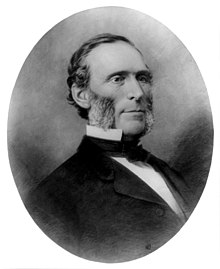Austin Blair
| Austin Blair | |
|---|---|
 |
|
| 13th Governor of Michigan | |
|
In office January 2, 1861 – January 5, 1865 |
|
| Lieutenant |
James M. Birney 1861 Joseph R. Williams 1861 (Acting) Henry T. Backus 1861-63 Charles S. May 1863-65 |
| Preceded by | Moses Wisner |
| Succeeded by | Henry H. Crapo |
| Member of the U.S. House of Representatives from Michigan's 3rd district |
|
|
In office March 4, 1867 – March 3, 1873 |
|
| Preceded by | John W. Longyear |
| Succeeded by | George Willard |
| Member of the Michigan Senate from the district |
|
|
In office 1855–1856 |
|
| Member of the Michigan House of Representatives | |
|
In office 1846-1849 |
|
| Personal details | |
| Born | February 8, 1818 Caroline, New York |
| Died | August 6, 1894 (aged 76) Jackson, Michigan |
| Political party | Republican |
| Spouse(s) | Sarah L. Ford |
Austin Blair (February 8, 1818 – August 6, 1894), also known as the Civil War Governor, was a politician from the U.S. state of Michigan. He was known as a strong opponent of slavery and secession and he also championed human rights by leading the effort to ban capital punishment and supporting efforts to give women and black citizens the right to vote.
Blair was born in Caroline, New York, in a log cabin built by his father George Blair of Scottish ancestry. It was reportedly the first cabin in Tompkins County, New York and Blair lived there until age 17, helping his father farm the land. He attended the common schools, Cazenovia Seminary and Hamilton College, before transferring to Union College in the middle of his junior year, graduating in 1839. Blair studied law in Oswego, New York and was admitted to the bar in Tioga County, New York in 1841. He moved to Michigan in that year, residing first in Jackson before moving to Eaton Rapids.
He began his political career in Eaton Rapids, where he was elected the clerk of Eaton County in 1842. He moved back to Jackson in 1844 and was a Whig member of the Michigan State House of Representatives from Jackson County from 1846 to 1849. He served on the House Judiciary Committee and was the leading proponent of the successful 1846 effort to abolish capital punishment in Michigan. He also introduced legislation to allow black citizens the right to vote. He left the Whig Party because they did not take a strong anti-slavery stance, and was a delegate to the Free Soil Party National Convention in Buffalo, New York in 1848 which nominated Martin Van Buren.
...
Wikipedia
